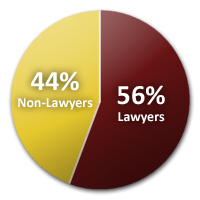Author: Stephen Ware
| State High Court & Judicial Nominating Commission | Composition & Terms of Judicial Nominating Commission | Judicial Selection Process | Legal Authority |
|---|---|---|---|
Terms: 4 years (staggered) |
General
Interim Vacancies
|

Percentage of Lawyers on the Nominating Commission

Who Selects the Nominating Commissioners?
Latest News
- Kansas Supreme Court rules unlawful stop nullifies drug conviction - WIBW
- Kansas Supreme Court throws out man's drug conviction over unlawful traffic stop - KCTV
- Kansas Supreme Court throws out man's drug conviction over unlawful traffic stop - KWCH
- Kansas Supreme Court Justice Dan Biles - themercury.com
- Kansas Supreme Court rejects rationale for pulling over motorist, searching vehicle - Kansas Reflector
- Republicans redouble push to change Kansas Supreme Court selection process - KCUR
- Supreme Court reverses ruling on man arrested for meth following traffic stop - WIBW
- Kansas Supreme Court Reinstates Conviction for 2019 Correctional Officer Battery Case - Ad Astra Radio
- Kansas Supreme Court makes license plate visibility ruling - KSNT 27 News
- Citing ‘prosecutorial error,’ Kansas Supreme Court overturns murder conviction for Johnson County man - KCTV
Scholarship & White Papers
Public Opinion Research
-
Declining to Follow Its Neighbor Missouri, the Kansas Supreme Court Holds Noneconomic Damages Cap in Medical Malpractice Cases Constitutional
The Kansas Supreme Court, in Miller v. Johnson,1 recently upheld Kansas’ statutory cap on non-economic damages in personal injury cases, including medical malpractice cases, as constitutional. Specifically, the Kansas Supreme Court held the cap, set forth in K.S.A. 60-19a02, does not violate Sections 5 and 18 of the Kansas Constitution Bill of Rights providing a right to a jury trial and a right to damages, respectively. This decision is in contrast to its neighboring state’s supreme court, which recently declared a statutory cap on non-economic damages in medical malpractice cases unconstitutional for violation of the right to a jury trial.2
-
Tenth Circuit Rejects Challenge to the Judicial Merit Selection Process in Kansas
The U.S. Court of Appeals for the Tenth Circuit has become the latest federal appellate court to weigh in on the constitutionality of the so-called “merit selection” method for selecting state court judges.1 Like the Eighth Circuit and Ninth Circuit courts before it, the Tenth Circuit upheld the key provision of the “merit selection” process against an Equal Protection Clause challenge.2 The Tenth Circuit’s decision was not unanimous, however. Further, the two judges in the majority disagreed on the appropriate analysis and application of relevant Supreme Court precedent. The divergent reasoning applied by the Tenth Circuit demonstrates the need for clarity from the Supreme Court. Only time will tell if such clarity will be provided.


 Kansas Supreme Court
Kansas Supreme Court